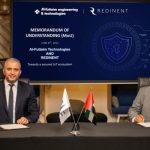Singapore based Tolaram is transforming Lagos Free Zone to boost business in Nigeria

Lagos Free Zone in Nigeria, on the West coast of Africa, has been promoted by Tolaram, an industrial conglomerate with more than four decades of experience in the country. Global brands including Colgate-Palmolive, Kellogg’s, BASF, Indofoods, Arla, Insignia Print Technologies and Stanbic IBTC, among others, have taken advantage of the facilities and infrastructure provided within the Zone.
When fully developed, Lagos Free Zone will be home to over 150 companies in seven to eight high-profile industrial clusters. The Lagos Free Zone is divided into three major areas:
- Industrial 70%
- Logistics 20%
- Real estate 10%
The industrial clusters that the Zone are targeting include:
- Food and Beverages
- Pharmaceuticals
- Chemicals and Downstream Oils
- Agro-processing
- Engineering
- Logistics
Fibre optic connectivity, provided by the Equinix company, MainOne, is available on site. Equinix, the American digital infrastructure operator, recently made a major thrust into the African continent, following a $320 Million acquisition of the Lagos-headquartered MainOne. Equinix has three operational data centres, with an additional facility being opened in Lagos.
Manufacturing within Lagos Free Zone comes with lower energy costs compared to manufacturing costs outside the Free Zone. The primary source of power is a rugged 7MW gas-fed power plant currently running on compressed natural gas, which provides cheap and reliable power to all enterprises. CNG is more cost-efficient than diesel generators, which is the primary power source for the manufacturing sector outside the Zone.
The Zone signed a Gas Infrastructure Development Agreement with a consortium of top energy companies to deliver piped natural gas to all our tenants by 2024. Switching from CNG to PNG will further reduce energy costs within the Zone.
Lagos Free Zone is connected to the hinterland by road. Lekki Port, which has a draught of 16.5 metres, is scheduled to be operational by December 2022, and will provide a cost-efficient access to regional and international markets. It will result in Lagos strengthening its position as a regional logistics hub.
Lagos Free Zone occupies 850 hectares, and its development has been broken down into three phases. Phase 1, which is currently under development, and is expected to be completed by 2024, covers 300ha. Most of the companies in this phase are expected to see movement in their business revenues when Lekki port, the deepest seaport in Nigeria, is commissioned in the fourth quarter of 2022.
The total amount of tenanted space in Lagos Free Zone has gone up from 12.27 million sqft in 2018 to 14 million sqft in 2022; the number of big clients has gone up from four to nine; and the total number of direct jobs in the Zone has gone up from 820 in 2018 to 1,200 in 2022.
Due to the pandemic of last two years, on a case-to-case basis, the Zone has extended flexibility in payment terms, for instance, by collecting rent in arrears for shorter lease duration instead of collecting in advance for longer lease duration. In addition, the Zone have extended a 25% discount on the amount payable by tenants towards obtaining the annual operating licenses for continuing operations within Lagos Free Zone.
Getting started
In order to operate within the Lagos Free Zone, one has to register as a Free Zone Enterprise or service provider. The proof of this registration is a singular operating license. All Lagos Free Zone registrations are handled in-house by the customer service team. The duration for the licence is approximately two weeks.
Lagos Free Zone has created a trouble-free business environment with a digitally enhanced single-clearance window. Bureaucratic delays and corruption are minimal. All relevant agencies which the enterprises work with daily are resident within the Zone. These include Nigeria Customs Service, Nigeria Immigration Service, Department of State Services, Nigeria Export Processing Zones Authority, and most recently, the National Agency for Food and Drug Administration and Control.
Lagos Free Zone is integrated with Lekki Port, the only deep seaport in Nigeria, which will go on stream in the last quarter of 2022. All relevant agencies and port authorities will be located on the port landside and will therefore be easily accessible.
The government of Nigeria has recognised the importance of providing for an efficient traffic evacuation corridor from the Lekki Port and is contractually obligated to deliver on the same as per the Concession granted to Lekki Port. As of today, the road expansion works to dualize the existing road leading up to Lekki Port with two lanes per direction are underway and are expected to be completed before cargo volumes at Lekki Port ramp up substantially.
Lagos Free Zone has provisions for rail in its masterplan and is well-positioned for any future rail integration plans. With regards to connectivity to the international airport, Lagos Free Zone is located about 100km from the Lagos International Airport which is the busiest aviation hub of Nigeria.
Prominent facilities include a Grade A warehouse of 9,000 sqm built-up space, a hazardous material warehouse, standard factories, truck park, medical facility, serviced apartments with gymnasium and restaurant, banks, central fire station, power plant, fibre optic connectivity.
The Zone has invested $15 million to commission the following new infrastructural developments:
Grade-A factories
Ready-to-lease factory premise that can reduce go-to-market time and capital requirements for new investors.
Work-living-play ecosystem
A five-storey residential building development with Balinese roof architecture. Sustainably developed, the building has a gross floor area of 4,000 sqm, including a 250 sqm common area for leisure activities. There is a total of 28 furnished, 2 bedroom-hall-kitchen flats.
Safety and security
The Zone has also completed and dedicated a state-of-the-art Central Fire Station and Central Police Command at Lagos Free Zone.
With Singapore based Tolaram, driving the vision and strategy of the Lagos Free Zone, African businesses can look forward to a transformative approach to their business.
What is in it for technology companies
- The first Free Zone in Nigeria with a dedicated fibre-optic cable connectivity for delivery of high-speed broadband network, launched in collaboration with MainOne.
- In combination with reliable power, gas and other shared infrastructure, Lagos Free Zone is suitable for the technology sector including landing stations for subsea cables, colocation data centres and data warehousing.
- Technology companies can take advantage of duty-free import of capital goods while setting up any technology centre and can rely on access to active population for their workforce.
- A skills training institute inside the Lagos Free Zone is planned to be launched in 2024.

Key takeaways
- Lagos Free Zone in Nigeria, on the West coast of Africa, has been promoted by Tolaram.
- Global brands including Colgate-Palmolive, Kellogg’s, BASF, Indofoods, Arla, Insignia Print Technologies, Stanbic IBTC are tenants.
- Manufacturing within Lagos Free Zone comes with lower energy costs compared to manufacturing costs outside the Free Zone.
- The Zone signed a Gas Infrastructure Development Agreement with a consortium of top energy companies to deliver piped natural gas to tenants by 2024.
- Switching from CNG to PNG will further reduce energy costs within the Zone.
- Equinix provides fibre connectivity and has three operational data centres, with an additional facility being opened in Lagos.
- The opening of Lekki Deep Water Port by end 2022 will strengthen Lagos’ position as a regional logistics hub.
- Phase 1 is currently under development and expected to be completed by 2024 covering 300ha.
- Most of the companies in this phase are expected to see increase in revenue when Lekki port is commissioned.
Who are the promoters of Lagos Free Zone?
Tolaram is a Singapore-headquartered enterprise focused on building businesses that propel growth and elevate communities. Since 1948, Tolaram has transformed from a single retail shop to a business that reaches over one billion customers across Asia, Africa, Europe, and South America. It is Africa’s largest consumer goods company with brands in packaged food and personal and household care.
It is also building Lagos Free Zone, Nigeria’s first privately-owned special economic zone with a fully integrated deep-sea port. Lekki Port, the single largest public infrastructure investment in the country, is built in partnership with China Harbour EC, the Lagos government, and the Nigerian Port Authority.
Tolaram has fintech interests in Indonesia, Estonia and Brazil and continues to seek strategic opportunities to drive financial inclusion for communities across emerging economies. In addition, Tolaram owns the only sack kraft paper producer in the Baltics making packaging products that are renewable, reusable, recyclable, and biodegradable.
The Lagos Free Zone is an attempt to provide single window clearances with supply chain integration and efficiency on the West Coast of Africa.






